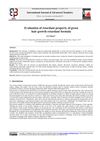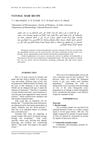 1 citations,
June 2023 in “Ethnobotany research and applications”
1 citations,
June 2023 in “Ethnobotany research and applications” The review concludes that the Ziziphus species, especially jujube, may promote hair growth and have various health benefits, warranting more research.
 1 citations,
February 2022 in “Scholars international journal of traditional and complementary medicine”
1 citations,
February 2022 in “Scholars international journal of traditional and complementary medicine” The herbal hair gel is effective, eco-friendly, and non-irritating with antifungal properties.
 July 2024 in “International Journal of Pharmaceutical Sciences and Medicine”
July 2024 in “International Journal of Pharmaceutical Sciences and Medicine” Nyctanthes arbor-tristis is effective for treating many health issues.
[object Object]  April 2024 in “Pharmacognosy research”
April 2024 in “Pharmacognosy research” The herbal hair dye with natural ingredients like henna was successfully made and tested, but more research is needed on its effectiveness on different hair colors and benefits.
 January 2023 in “International Journal of Research Publication and Reviews”
January 2023 in “International Journal of Research Publication and Reviews” Some herbal ingredients like linalool and tea tree oil have anti-dandruff properties and are safe for use in shampoos.
 May 2022 in “Pharmacognosy journal”
May 2022 in “Pharmacognosy journal” Moringa seed oil may help prevent hair loss and promote hair growth.
 May 2019 in “International journal of advanced chemistry”
May 2019 in “International journal of advanced chemistry” The green cream safely slowed hair growth by 25%.

The document explains how certain drugs block hormones to treat cancers like breast and prostate cancer.
 June 2004 in “Bulletin of Pharmaceutical Sciences. Assiut University”
June 2004 in “Bulletin of Pharmaceutical Sciences. Assiut University” The natural hair treatment with Cantharidin works best for hair loss.
 March 2023 in “International Journal of Advanced Research in Science, Communication and Technology”
March 2023 in “International Journal of Advanced Research in Science, Communication and Technology” Various medicinal plants like Polygonum multiflorum, Red ginseng extract, and Zizyphus jujuba can potentially treat hair loss, offering benefits like low cost and multiple ways of working. Other effective natural substances include Pygeum africanum, Seneroa, Urtica dioica, and more.
 152 citations,
April 2012 in “Recent Patents on Inflammation & Allergy Drug Discovery”
152 citations,
April 2012 in “Recent Patents on Inflammation & Allergy Drug Discovery” Minoxidil treats hair loss, promotes growth, has side effects, and has recent patents.
 151 citations,
July 2011 in “Archives of Dermatological Research”
151 citations,
July 2011 in “Archives of Dermatological Research” Liposomal systems show promise for delivering drugs through the skin but face challenges like high costs and stability issues.
 134 citations,
June 2005 in “Neuropsychopharmacology”
134 citations,
June 2005 in “Neuropsychopharmacology” GABRA2 gene variations impact alcohol response, and hair loss medication finasteride reduces some effects.
 95 citations,
April 2013 in “PLOS ONE”
95 citations,
April 2013 in “PLOS ONE” Ginseng is possibly safe but its effectiveness is unclear due to poor quality studies and mixed results.
 94 citations,
September 2014 in “Therapeutic Delivery”
94 citations,
September 2014 in “Therapeutic Delivery” Nanoparticles can improve skin treatments by better targeting hair follicles, but more research is needed for advancement.
 61 citations,
May 2015 in “Planta”
61 citations,
May 2015 in “Planta” Certain fungi and bacteria help orchid seeds germinate and plants grow better.
 58 citations,
December 2012 in “Aaps Pharmscitech”
58 citations,
December 2012 in “Aaps Pharmscitech” LCN may improve finasteride delivery for hair loss treatment.
 49 citations,
July 2009 in “Fitoterapia”
49 citations,
July 2009 in “Fitoterapia” Essential oils from Chamaecyparis obtusa may help hair grow by increasing a growth-related gene.
 47 citations,
December 2002 in “Journal of Neurochemistry”
47 citations,
December 2002 in “Journal of Neurochemistry” Progesterone boosts alcohol's effect on brain, finasteride counters it.
 41 citations,
July 2015 in “Current Drug Discovery Technologies”
41 citations,
July 2015 in “Current Drug Discovery Technologies” Some plants may help with hair growth and have fewer side effects than synthetic drugs, but more research is needed to confirm their effectiveness.
 40 citations,
January 2010 in “Indian Journal of Dermatology, Venereology and Leprology”
40 citations,
January 2010 in “Indian Journal of Dermatology, Venereology and Leprology” Certain diets can affect skin conditions, but more research is needed to understand these relationships fully.
 39 citations,
June 2017 in “Journal of Applied Research on Medicinal and Aromatic Plants”
39 citations,
June 2017 in “Journal of Applied Research on Medicinal and Aromatic Plants” Plant-based ingredients are effective and safe for modern skincare products.
[object Object]  39 citations,
July 2016 in “Biomedicine & Pharmacotherapy”
39 citations,
July 2016 in “Biomedicine & Pharmacotherapy” Cedrol from Platycladus orientalis leaves may promote hair growth effectively, especially in female mice.
 35 citations,
May 2012 in “Cochrane Database of Systematic Reviews”
35 citations,
May 2012 in “Cochrane Database of Systematic Reviews” Minoxidil effectively treats female pattern hair loss.
 34 citations,
September 1992 in “Journal of the American Academy of Dermatology”
34 citations,
September 1992 in “Journal of the American Academy of Dermatology” Dermatologists need to know about cosmetics to help patients with skin issues and recommend safe products.
 32 citations,
November 2020 in “Nanomaterials”
32 citations,
November 2020 in “Nanomaterials” Excipients greatly affect how well curcumin nanocrystals penetrate the skin and target hair follicles.
 30 citations,
June 2017 in “Talanta”
30 citations,
June 2017 in “Talanta” MALDI Imaging Mass Spectrometry is a useful method for studying skin conditions, but sample preparation is crucial for accurate results.
 30 citations,
January 2000 in “Dermatologic Clinics”
30 citations,
January 2000 in “Dermatologic Clinics” Finasteride and minoxidil are effective FDA-approved treatments for androgenetic alopecia.
 27 citations,
December 2005 in “Journal of Cosmetic Dermatology”
27 citations,
December 2005 in “Journal of Cosmetic Dermatology” Niacin derivatives may increase hair fullness in women with hair loss.
 25 citations,
July 2019 in “Journal of drug delivery science and technology”
25 citations,
July 2019 in “Journal of drug delivery science and technology” Researchers created better skin-application menthol capsules that are stable, safe, and penetrate the skin quickly.





























